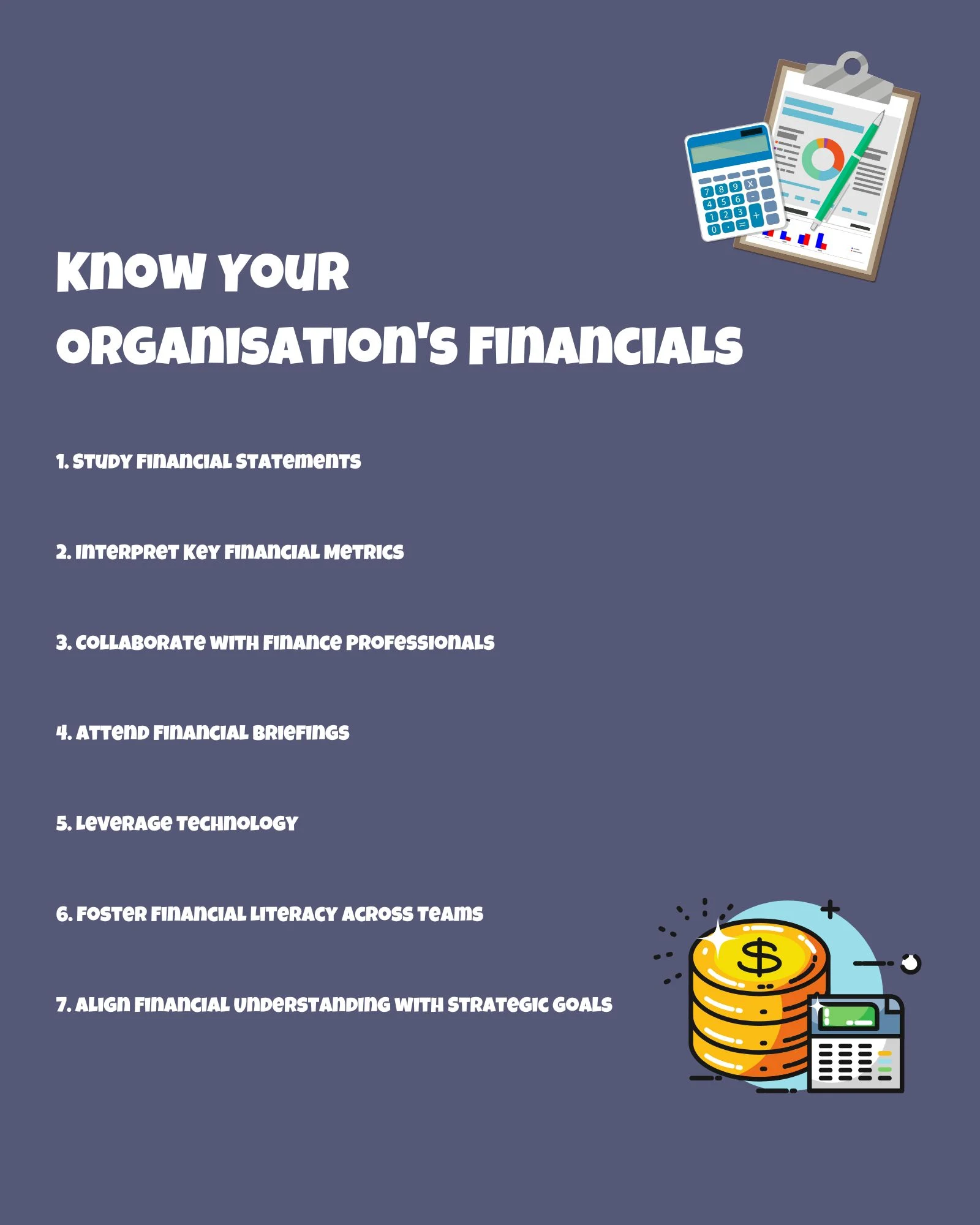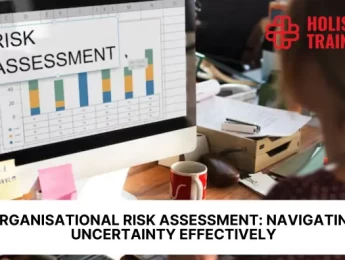- Table of Contents
- Introduction
- What Is Financial Acumen?
- Why Do I Need Financial Acumen?
- Financial Decision-Making
- Resource Allocation
- Cash Flow Management
- Financial Performance Evaluation
- Risk Management
- Investor Relations
- Strategic Planning
- How to Develop Financial Acumen
- 1. Expand Your Knowledge
- 2. Seek Mentorship
- 3. Analyse Real-Life Scenarios
- 4. Gain Practical Experience
- Creating Tax Strategies
- 1. Stay Informed
- 2. Seek Professional Advice
- 3. Plan Ahead
- 4. Monitor Changes
- 5. Leverage Technology
- 6. Remember the Ethics Behind It All
- 7. Collaborate Strategically
- Know Your Organisation's Financials
- 1. Study Financial Statements
- 2. Interpret Key Financial Metrics
- 3. Collaborate with Finance Professionals
- 4. Attend Financial Briefings
- 5. Leverage Technology
- 6. Foster Financial Literacy Across Teams
- 7. Align Financial Understanding with Strategic Goals
- The Role of Technology in Revolutionising Financial Acumen
- Real-Time Data Access
- Automation and Efficiency
- Big Data and Predictive Analytics
- Blockchain Technology
- Mobile Apps and Financial Literacy
- Conclusion
Introduction
In today's complex and dynamic business world, financial acumen is a critical skill that individuals must possess to navigate the intricacies of financial management successfully. Financial acumen refers to comprehending and applying financial knowledge and insights to make informed decisions. Whether you're a business professional, an entrepreneur, or simply seeking personal financial growth, developing financial acumen is essential. In this blog post, we will delve into the concept of financial acumen, understand its significance, explore strategies to develop it, and emphasise the importance of tax strategies and organisational financial awareness.
What Is Financial Acumen?
Financial acumen is the comprehension and application of financial knowledge to analyse, interpret, and make informed decisions about financial matters. It encompasses a range of skills, including financial literacy, understanding financial statements, forecasting, budgeting, strategic planning, risk assessment, and resource allocation. Financial acumen enables individuals to identify financial opportunities and risks, optimise financial performance, and drive organisational growth and profitability.
Why Do I Need Financial Acumen?
Financial acumen is particularly crucial for business owners and managers. Here are some reasons why it is essential for the success of your business:
Financial Decision-Making
Business owners must make numerous financial decisions, such as pricing strategies, investment choices, and funding options. Financial acumen enables you to analyse the financial implications of these decisions, assess risks, and make informed choices that align with your business objectives.
Resource Allocation
Picture a business as a puzzle, where each piece represents a resource. The challenge lies in placing these pieces in a manner that efficiently completes the picture. Financial acumen provides the lenses to evaluate projects, calculate Return on Investment (ROI), and allocate resources judiciously. It aids in understanding the financial health of various projects and departments, enabling businesses to channel their investments to maximise their benefit. This precise allocation ensures that financial and non-financial resources are utilised optimally, enhancing the efficiency and productivity of the organisation.
Cash Flow Management
Cash flow, often described as a business's lifeblood, is a testament to its viability. Financial acumen empowers individuals to monitor the inflow and outflow of cash meticulously. By understanding the nuances of cash flow management, businesses can anticipate financial gaps, devise contingency plans, and ensure funds' availability when needed the most. This proactive approach to managing cash flow ensures that the business remains solvent even during challenging times, preventing liquidity crises and fostering financial stability.
Financial Performance Evaluation
Understanding a business's health requires more than just glancing at balance sheets. Financial acumen delves deep into the financial statements, allowing individuals to calculate vital metrics such as revenue growth, profitability, liquidity, and debt-to-equity ratios. These metrics act as a barometer, indicating the efficiency and effectiveness of various operations. By conducting a comprehensive financial performance evaluation, businesses can identify areas of improvement or concern, enabling them to make data-driven decisions to enhance their profitability and sustainability.
Risk Management
Every business faces various financial risks, such as market fluctuations, regulatory changes, and economic uncertainties. Financial acumen enables you to identify potential risks, assess their impact on your business, and implement risk mitigation strategies. It empowers you to make informed decisions that minimise financial vulnerabilities, which gravely helps in risk management.
Investor Relations
Financial acumen is a beacon of trust for businesses seeking external investments. Investors scrutinise financial health meticulously before committing their resources. Possessing financial acumen allows business owners to present a clear, concise, and compelling picture of their financial status. It enables effective communication with investors, instils confidence, and fosters trust. Businesses with financial acumen can answer investor queries astutely, creating an environment conducive to attracting substantial investments and fueling growth and expansion.
Strategic Planning
The foundation of effective strategic planning is grounded in financial acumen. Businesses can formulate robust strategies by comprehending financial data, market trends, and industry dynamics. Financial insights not only aid in setting realistic financial goals but also enable businesses to identify growth opportunities. This alignment of strategic direction with financial objectives ensures that the organisation’s endeavours are both visionary and financially viable.
Financial acumen is the compass that guides businesses through the intricate maze of financial decisions. It empowers individuals to make well-informed choices, allocate resources judiciously, manage cash flow efficiently, evaluate performance objectively, mitigate risks proactively, nurture investor relations, and craft strategic plans that are both visionary and grounded in financial reality. As businesses navigate the competitive landscape, possessing financial acumen is not just an advantage; it’s a necessity, ensuring their longevity and prosperity in an ever-evolving business ecosystem.
How to Develop Financial Acumen
Developing financial acumen is a continuous process that requires dedication and a proactive approach. Here are some strategies to help you enhance your financial intelligence:
1. Expand Your Knowledge
The foundation of financial acumen rests on a bedrock of knowledge. Begin your journey by immersing yourself in financial literature. Books authored by financial experts, online courses from reputable institutions, and webinars conducted by industry leaders offer a treasure trove of information. Dive deep into accounting principles, financial analysis, investment strategies, and the interpretation of financial statements. Understanding these basics equips you with the vocabulary and conceptual understanding necessary for advanced financial learning.
2. Seek Mentorship
One of the most effective ways to accelerate your learning curve is by seeking mentorship. A mentor, preferably someone with a wealth of financial acumen, can provide personalised guidance. Their practical experiences, insights, and lessons from past mistakes are invaluable. A mentor clarifies complex concepts and offers real-world perspectives, bridging the gap between theoretical knowledge and practical application.
3. Analyse Real-Life Scenarios
Knowledge truly crystallises when applied to real-life situations. Dive into case studies, industry reports, and financial news. Analyse the financial decisions made by successful companies and dissect the consequences of poor financial choices. This analytical exercise hones your critical thinking skills, enabling you to evaluate financial risks and opportunities in diverse contexts. Understanding the nuances of various scenarios enhances your ability to make informed decisions when faced with similar circumstances.
4. Gain Practical Experience
Theory finds its true meaning when put into practice. Seek opportunities to gain hands-on experience in financial roles or projects. This could involve volunteering for financial tasks within your organisation, participating in financial simulations, or even managing your personal finances meticulously. Practical experience deepens your understanding of financial concepts, allowing you to navigate the complexities of real-world financial challenges. Learning from successes and failures in practical scenarios provides invaluable insights that textbooks often overlook.
Creating Tax Strategies
One crucial aspect of financial acumen is developing effective tax strategies. You’d think that in countries where taxes take up a huge chunk of someone’s monthly earnings, like America, people would have decent financial knowledge. However, statistics show that an underwhelming 57% of American adults are financially literate. Taxes can significantly impact an individual's or organisation's financial health. Understanding tax laws and regulations lets you optimise your tax planning and minimise tax liabilities. Consider the following steps to create tax strategies:
1. Stay Informed
The tax landscape is ever-changing, shaped by legislation, economic shifts, and global events. As a prudent financial practitioner, staying informed is non-negotiable. Regularly updating your knowledge on the latest tax laws, deductions, exemptions, and incentives provides the groundwork for effective tax planning. Awareness of these nuances allows you to identify opportunities and tailor your tax strategy to align with the prevailing tax codes.
2. Seek Professional Advice
Navigating the labyrinthine corridors of tax laws requires expertise. Seeking professional advice from tax consultants or certified accountants is a wise investment. These experts bring a wealth of knowledge and experience to the table. Their insights are tailored to your specific circumstances, ensuring that your tax strategy is compliant and optimised for maximum benefit. Moreover, tax professionals can unravel complex tax codes, identify potential deductions, and guide you through intricate tax planning, saving both time and resources.
3. Plan Ahead
Procrastination has no place in tax planning. Effective tax strategies are built on proactive planning. Consider factors such as the timing of income and expenses, investment strategies, retirement planning, and even the structure of your business. By anticipating tax implications, you can optimise tax efficiency. For instance, aligning significant expenses with favourable tax periods can result in substantial savings. Proactive planning minimises tax liabilities and reduces last-minute scrambles during tax season, ensuring a smooth and stress-free process.
4. Monitor Changes
Tax laws are dynamic and subject to regular changes and amendments. Vigilance is key. Regularly monitoring changes in tax rates, deductions, exemptions, or reporting requirements allows you to adapt your tax strategy accordingly. What worked last year might not be applicable this year. By staying vigilant, you can make timely adjustments, ensuring your tax plan remains in sync with the current tax landscape. This adaptability is a hallmark of effective tax planning, safeguarding your financial interests against legislative shifts.
5. Leverage Technology
In the digital age, technology is a powerful ally in tax planning. Financial software and tax calculators provide accurate computations, reducing the margin for error. Utilising these tools not only ensures precision in calculations but also enhances efficiency. Additionally, technology enables real-time tracking of financial transactions, allowing for proactive decision-making. Automation streamlines the tax filing process, making it smoother and more efficient. By embracing technology, you save time and minimise the risk of errors, ensuring compliance and maximising your tax benefits.
6. Remember the Ethics Behind It All
Effective tax planning goes beyond legal compliance; it embraces ethical considerations. Ethical tax planning ensures that financial decisions are made with integrity, considering legal obligations and social responsibility. Transparent financial reporting, fair representation of income, and responsible use of tax incentives are fundamental to ethical tax planning. Ethical considerations in tax strategy safeguard your reputation and contribute to the broader societal good, fostering trust and sustainability in financial practices.
7. Collaborate Strategically
Tax planning does not occur in isolation. It is interwoven with various financial decisions within an organisation. Collaboration between financial departments, legal teams, and tax professionals fosters synergy. Organisations can optimise their overall financial performance by aligning tax strategies with broader financial objectives. Cross-functional collaboration ensures that tax planning is not an isolated effort but an integral part of the organisation's holistic financial strategy. This strategic collaboration enhances the effectiveness of tax planning initiatives, maximising their impact on financial outcomes.
Tax Planning Strategy | Description | Advantages |
Timing of Income & Expenses | Strategically shifting income and expenses across years | Optimises tax brackets, reducing overall tax liability. |
Business Structure Optimisation | Choosing an optimal legal structure for tax benefits | Can reduce personal liability and lower overall tax rates. |
Maximising Deductions | Identifying and claiming all eligible tax deductions | Lowers taxable income, leading to reduced tax obligations. |
Investment Tax Planning | Structuring investments for tax efficiency | Utilises tax-free or tax-deferred accounts to minimise tax. |
Tax Credit Utilisation | Leveraging available tax credits for significant savings | Direct reduction in the amount of tax owed to the government. |
Table 1: Tax planning strategies comparison
In summary, creating effective tax strategies is a multifaceted endeavour that requires knowledge, expertise, foresight, technological acumen, ethical integrity, and strategic collaboration. By staying informed, seeking professional advice, planning ahead, monitoring changes, leveraging technology, considering ethical implications, and fostering collaboration, you can craft tax strategies that are compliant and optimised for financial benefit. Effective tax planning empowers individuals and organisations to confidently navigate the complex tax landscape, ensuring that financial resources are utilised judiciously, leading to financial stability and sustainable growth.
Know Your Organisation's Financials
Another critical aspect of financial acumen is understanding your organisation's financials. This knowledge enables you to contribute meaningfully to strategic discussions and make informed decisions. Consider the following steps to enhance your organisational financial awareness:

1. Study Financial Statements
Financial statements are the primary source of information about a company’s financial health. Delving into the balance sheet, income statement, and cash flow statement provides a comprehensive view of the organisation's financial performance. Understanding these statements, line by line, allows you to grasp the company's assets, liabilities, revenue streams, and expenditure patterns. By interpreting the financial statements, you gain insights into the company's profitability, liquidity, and solvency, providing a solid foundation for strategic planning.
2. Interpret Key Financial Metrics
Beyond the financial statements, key financial metrics act as an organisation's vital signs. Metrics like revenue growth, profit margins, return on investment (ROI), debt-to-equity ratios, and working capital turnover ratios offer nuanced insights. These metrics quantitatively measure the organisation’s efficiency, profitability, and financial stability. By interpreting these metrics, you can identify trends, gauge performance against industry benchmarks, and pinpoint areas that need improvement or investment.
Financial Metric | Description | Significance |
Revenue Growth | Percentage increase in company revenue | Indicates business expansion potential |
Profit Margin | Ratio of profit to total revenue | Measures efficiency in cost management |
Debt to Equity Ratio | Propotiion of debt to shareholders’ equity | Evaluates financial leverage and risk |
Working Capital Turnover | Effciency in utilising working capital | Reflects operational liquidity efficiency |
Return on Investement (ROI) | Gain or loss from investment relative to cost | Measures investment profitability |
Table 2: Key financial metrics overview
3. Collaborate with Finance Professionals
Finance professionals within the organisation are invaluable assets. Engaging with them provides a deep understanding of financial analysis, budgeting, forecasting, and financial modelling. Collaborating with these experts allows you to dive into complex financial concepts, ask questions, and seek clarifications. Their expertise can illuminate financial intricacies, empowering you to make informed decisions. Finance professionals can also guide you in translating financial data into actionable strategies, ensuring alignment between financial objectives and overall business goals.
4. Attend Financial Briefings
Financial briefings and presentations organised within the organisation offer a direct line of sight into the company’s financial performance, strategic priorities, and challenges. Attending these sessions provides a firsthand account of the financial landscape. Participating in these briefings, asking questions, and engaging in discussions deepen your understanding. These interactions offer strategic insights, allowing you to align your decisions with the company's overall direction, ensuring synergy between financial objectives and organisational goals.
5. Leverage Technology
Utilise financial software and tools available within your organisation to gain real-time insights into financial data. Familiarise yourself with financial dashboards and reporting systems. This knowledge will empower you to access and interpret financial information independently. Leveraging technology will also help acquire accurate data, increase efficiency, and reduce human error, making processes run smoothly, according to BusinessTech.
6. Foster Financial Literacy Across Teams
Financial literacy is not limited to the finance department alone. Fostering financial literacy across different teams and departments empowers decision-makers at all levels. Workshops, training sessions, and seminars can impart basic financial knowledge, enabling employees to comprehend financial implications within their spheres of influence. Financially literate teams make more informed decisions, ensuring that financial considerations are integrated into diverse aspects of the business, fostering a financially savvy organisational culture.
7. Align Financial Understanding with Strategic Goals
Understanding your organisation’s financials is not an isolated endeavour; it should align seamlessly with strategic objectives. By integrating financial insights into strategic planning, businesses can set realistic financial goals, allocate resources judiciously, and pursue growth opportunities strategically. Financial understanding becomes a compass, guiding the organisation toward sustainable growth and profitability. Aligning financial acumen with strategic goals ensures that every financial decision contributes to realising the organisation's overarching vision.
In essence, understanding your organisation’s financials transcends numerical comprehension; it is about deriving actionable insights, fostering collaboration, embracing technology, nurturing financial literacy, and aligning financial understanding with strategic imperatives. By immersing yourself in the organisation's financial fabric, you gain the foresight needed to make decisions that resonate with financial prudence and strategic acumen. In the ever-changing business landscape, this understanding becomes a strategic imperative and the bedrock of informed and impactful decision-making, driving the organisation toward sustained success and prosperity.
The Role of Technology in Revolutionising Financial Acumen
In the ever-evolving landscape of financial acumen, technology plays a pivotal role, revolutionising how individuals and organisations approach financial management. A 2019 study showcased a significant trend: 77% of participants opted for technology over traditional methods in handling financial tasks. Among the six activities surveyed—depositing checks, reviewing bank statements, tracking expenses, transferring funds, withdrawing cash, paying bills, and online shopping—respondents preferred tech solutions for five of them. That being said, here are the different ways technology impacts financial acumen and enhances decision-making processes:
Real-Time Data Access
Technology has democratised access to financial information. Advanced software and digital platforms offer real-time data insights, allowing individuals and businesses to monitor their financial health instantaneously. Real-time data access empowers proactive decision-making. Entrepreneurs can track sales, expenses, and market trends in real-time, enabling them to adjust strategies swiftly. For individuals, this means monitoring investments and expenses on the go, ensuring immediate responses to market fluctuations and financial challenges.
Automation and Efficiency
Automation, a cornerstone of technological advancement, streamlines financial tasks with precision. Financial software automates calculations, reducing the margin for human error. In businesses, tasks like payroll management, invoicing, and expense tracking are automated, saving time and resources. Budgeting apps automate expense categorisation for individuals, offering insights into spending patterns. This efficiency saves time and ensures accuracy, fostering a more productive and error-free financial management process.
Big Data and Predictive Analytics
The financial sector stands as one of the most disrupted industries due to the advent of digitalisation and innovative methods for handling vast volumes of data, according to CEPR. Businesses harness vast amounts of data to identify market trends, customer behaviours, and financial patterns. Predictive analytics forecast future trends, enabling businesses to adjust their strategies preemptively. For individuals, predictive tools assess investment portfolios, offering insights into potential risks and returns. These technologies enable proactive planning, ensuring financial decisions are rooted in data-driven insights rather than intuition alone.
Blockchain Technology
Blockchain technology, renowned for its role in cryptocurrency, has broader implications for financial acumen. Its decentralised nature enhances the security and transparency of financial transactions. In businesses, blockchain ensures tamper-proof financial records, enhancing trust between stakeholders. For individuals, blockchain enhances security in online transactions and investments, safeguarding sensitive financial information. This technology fosters a more secure financial ecosystem, reducing the risk of fraud and ensuring the integrity of financial transactions.
Mobile Apps and Financial Literacy
Mobile apps have democratised financial education. Numerous apps offer interactive modules, engagingly teaching financial literacy. From budgeting to investment strategies, these apps cater to a wide audience. For entrepreneurs, mobile apps offer insights into market trends and competitor analysis on the go. Individuals can simulate investment scenarios, enhancing their understanding of financial risks. Mobile apps bridge the knowledge gap, making financial education accessible to a global audience and empowering both individuals and businesses to make more informed financial decisions.
In short, technology's impact on financial acumen is transformative. Real-time data access, automation, predictive analytics, blockchain technology, and mobile apps collectively reshape financial decisions. Embracing these technological advancements empowers individuals and organisations to navigate the financial landscape with agility, ensuring that decisions are informed and strategic. In the digital age, technological proficiency is not just a competitive advantage; it is a fundamental requirement for financial success, enabling a future where financial acumen is not just a skill but a tech-powered strategic asset.
Conclusion
Financial acumen is vital for individuals in various aspects of life, from personal finance management to entrepreneurship and business management. By developing financial acumen, you can make informed decisions, navigate financial challenges, and drive long-term financial success. Remember to continuously educate yourself, seek mentorship, gain practical experience, create effective tax strategies, and understand your organisation's financials. As you embark on this journey, you will unlock the power of financial intelligence, empowering yourself to shape a prosperous future.
If you’re just starting with financial management and would like to learn more about the topic, we invite you to check out our course ‘Financial Acumen for Non-Finance Experts’. As the name suggests, you don’t have to be an expert to join it. Kickstart your financial management journey today and enrol now!
























